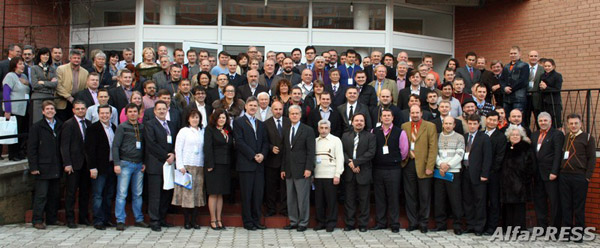Evangelism in a post-Soviet era was the topic of the first ever Lausanne Eurasian Consultation held 6-7 December 2011 in Russia. Some 150 participants from 17 countries of the Commonwealth of Independent States and Baltic states, representatives of churches and denominations, gathered in Moscow to discuss and develop evangelism strategies in light of The Cape Town Commitment. On the very first day of the meeting participants were delighted to learn that Iran had officially joined the Eurasian Region within The Lausanne Movement and were excited to learn more about work in this Islamic country.
Eurasian leaders welcomed Lindsay Brown (Lausanne International Director, UK), Blair Carlson (Lausanne Senior Associate for Proclamation Evangelism and Cape Town 2010 Congress Director, USA) and Ole-Magnus Olafsrud (coach and developer at The Navigators-Europe, Norway) who shared their perception of further development of Lausanne in the region. Lindsay Brown urged the leaders to keep in mind the Lausanne vision – to bear witness to Jesus Christ and all his teachings in every area of society, both geographically and in the realm of ideas.
Blair Carlson discussed the idea of establishing a School of Evangelism in the post-Soviet era in order to train evangelists who would then share the gospel in every sphere of life in contemporary society.
During the meetings the importance of the Evangelical Church in Eurasia influencing society through the active involvement in city and communities was emphasized. This led to the start of a new urban evangelization project under the draft name “8+4”, where the number 8 implies Russian cities and the number 4 stands for cities of other CIS countries. One of the main project points consists of collaboration through sister-churches and sister-cities within Eurasia and abroad. This idea may lead to cooperation between all 12 regions of The Lausanne Movement.

According to the best Lausanne consultation format, the gathering involved the majority of participants in active work. Throughout the two days, leaders participated in plenary sessions and five workshops on The Cape Town Commitment and the discussion of new projects on the following topics:
- How to witness about the truth of Christ in a pluralistic, globalized world;
- Mass-media as a tool of global mission;
- Building the peace of Christ in our divided and broken world;
- Partnering in the Body of Christ toward unity in ministry;
- Bearing witness to the love of Christ with people of other faiths.
Our hope is that this event becomes a catalyst and a great encouragement toward revival in Eurasian countries. On the last day of the Consultation, candidates for regional Lausanne network teams and representative participation from Eurasia on the international level were suggested.
The Lausanne Movement leadership team and consultation participants express their gratitude to the Russian Church for its financial contribution to the Consultation and to the organizing committee headed and hosted by Pavel Kolesnikov (pastor of a Baptist church in Moscow). This group had been working hard for over 3-and-a-half months to prepare for the event.
The next Eurasia Regional Consultation is anticipated to be held in Central Asia.

